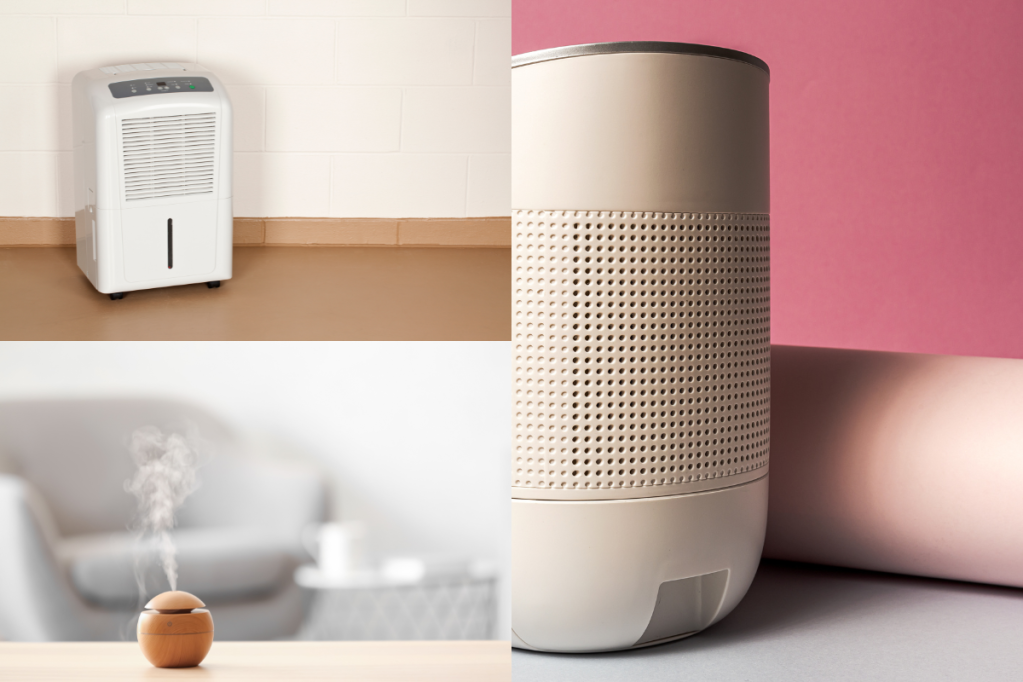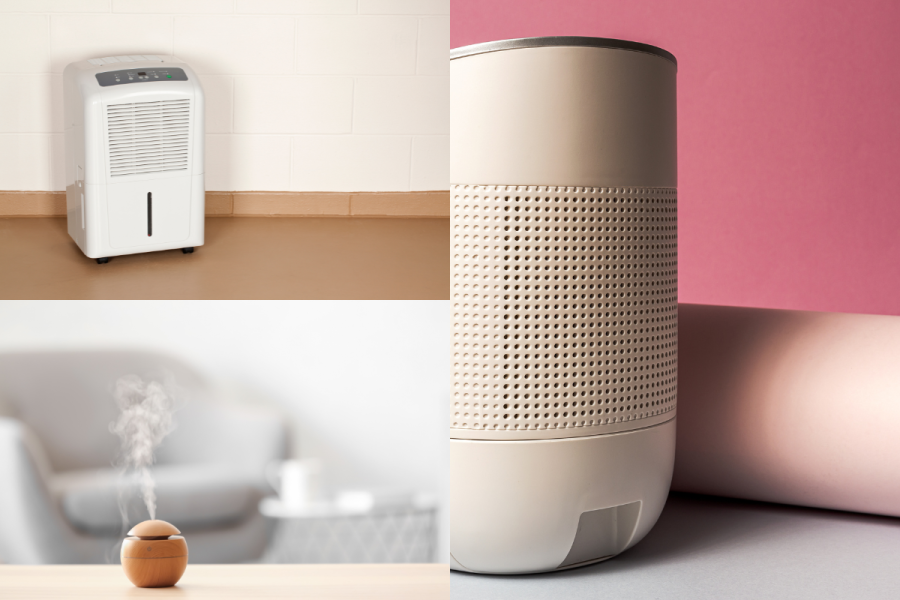In terms of enhancing indoor air quality, diffusers and dehumidifiers are commonly suggested devices. Despite having distinct functions, both of these devices greatly impact one’s overall well-being. This article will elucidate the dissimilarities between dehumidifiers and diffusers, as well as the advantages and disadvantages of each. By the end of this piece, you will possess more knowledge about which contraption is suitable for your abode. –This is Dehumidifier vs Diffuser

What is a dehumidifier?
Dehumidifiers are apparatuses that eliminate superfluous moisture from the atmosphere. The procedure involves attracting damp air, which is subsequently cooled to precipitate the moisture. The dehydrated air is then circulated back into the space, whereas the amassed moisture is collated in a receptacle.
Dehumidifier Benefits
The subsequent are several benefits of owning a dehumidifier in your domicile:
Controlling mold and mildew: Despite being hazardous to one’s well-being, mold and mildew can prosper in excessively moist environments. Nevertheless, a dehumidifier can mitigate the progression of mold and mildew by regulating atmospheric humidity levels.
In environments with high humidity, ubiquitous allergens such as mold, mildew, and dust mites can thrive. By diminishing atmospheric humidity levels, a dehumidifier can aid in mitigating allergy symptoms.
Enhancing air quality: Overly moist air can contribute to substandard air quality. Nevertheless, a dehumidifier can ameliorate indoor air quality by facilitating the elimination of superfluous moisture from the atmosphere.
drawbacks of a dehumidifier
Although using a dehumidifier has many benefits, there are also some drawbacks. They comprise:
Noise level: If you plan to use the device while sleeping or working, it can disturb you. Certain dehumidifiers can make noise.
Prices for dehumidifiers can be considerable, particularly if a larger unit is needed for a larger room.
With dehumidifiers, routine maintenance is required, including cleaning the unit and draining the reservoir. If this maintenance is overlooked, mold and mildew may begin to develop inside the device.
Dispersion: What is it?
A diffuser disperses essential oils into the atmosphere. It works by breaking down the essential oils into tiny particles, then releasing a fine mist of them into the air. The mist can then be inhaled to deliver a range of benefits depending on the type of essential oil utilized.
The advantages of a diffuser
There are several reasons why you might want to utilize a diffuser in your home, including:
Calming properties: Lavender and chamomile are two essential oils that are known to encourage calm. When you diffuse these essential oils, you’ll be able to relax and experience reduced stress and anxiety.
Diffusing essential oils has additional advantages that could improve sleep quality, including lowering stress and anxiety levels and promoting relaxation.
Another advantage of essential oils is that they can improve your mood. Certain essential oils are calming, while others are energizing.
The drawbacks of a Diffuser
While using a diffuser has many benefits, there are some drawbacks as well. They comprise:
Diffusers only have the ability to disperse essential oils into the air; dehumidifiers may remove moisture from the air.
Diffusers need regular maintenance, such as cleaning and essential oil replacement.
The cost of essential oils can add up rapidly, whilst the price of dehumidifiers and diffusers may vary.
Which of the choices is the best?
After we’ve examined their benefits and drawbacks, the issue of which dehumidifier or diffuser you ought to choose for your home still exists.
The decision would hinge on your distinct requirements and inclinations. Should you dwell in a damp climate or possess a location that is susceptible to superfluous dampness, a dehumidifier might present itself as the superlative option. On the other hand, if you yearn to augment the atmosphere of your domicile while employing essential oils, a diffuser could be the quintessential alternative.
Consideration should also be given to the fact that both appliances can be used in your home. If you believe that using essential oils has many advantages and you live in a humid location, using a dehumidifier and diffuser together can improve the air quality in your home while also promoting calmness and reducing tension.
Dehumidifier Purchasing Guide
If you’ve concluded that installing a dehumidifier in your house is a good idea, here are some things to think about.
The acquisition of an aptly-sized dehumidifier for your abode is critical to maintain a balanced indoor climate. As there is a plenitude of sizes available in the market, it is essential to select one that is well-suited for the space you intend to employ it in. A judicious selection is imperative to optimize the dehumidifier’s efficacy in regulating humidity levels.
It behooves you to deliberate the dehumidifier’s dimensions in comparison to the area’s size. Large spaces warrant a 50-pint dehumidifier for optimal performance, while compact areas are best suited to a 30-pint alternative. By procuring a dehumidifier commensurate with the intended space, you are likely to achieve the desired outcomes with alacrity.
If you intend to use the dehumidifier in a bedroom or office, select one with a quiet operation.
Be mindful of the dehumidifier’s energy efficiency as it has the potential to consume a considerable amount of electricity. Opt for an energy-efficient model to help reduce your monthly power expenses.
Some Advice for Picking a Diffuser
Here are some ideas for selecting the best diffuser if you’ve determined that it’s the best option for your home:
Depending on your requirements, choose a diffuser that nebulizes, heats, or emits ultrasonic waves. Ultrasonic diffusers are frequently the most affordable option and are generally accessible.
Considering size Diffusers are available in different sizes in addition to dehumidifiers. Select a model that will operate in the space where it will be installed.
To conserve money and prevent the diffuser from running continuously, choose a diffuser with a timer.
Conclusion
The air quality in your home can be dramatically impacted by diffusers and dehumidifiers. Diffusers release essential oils to improve the atmosphere while dehumidifiers remove excess moisture from the air. Make your option between a diffuser and a dehumidifier fully based on your personal preferences and needs. You can make an educated choice by weighing the benefits and drawbacks of each product and adhering to the guidelines for picking the best option for your house.
FAQs
Do diffusers work well in humid environments?
A dehumidifier will, however, have a greater influence in a humid environment than a diffuser. Diffusers are designed to spread essential oils throughout the air, rather than eliminating moisture from it like a dehumidifier can.
At what point should I clean my diffuser?
It’s important that you clean your diffuser after each use to prevent the buildup of residue from essential oils. After being cleaned using a moderate soap and warm water, the diffuser should be well dried before being used again.
How frequently do I need to dump my dehumidifier?
You should empty your dehumidifier once daily or more frequently as needed, depending on the humidity levels in your home.
